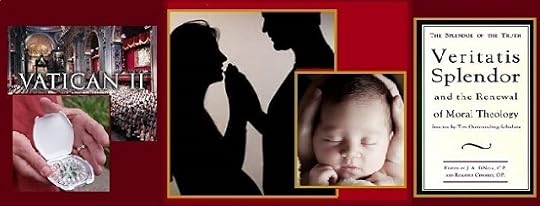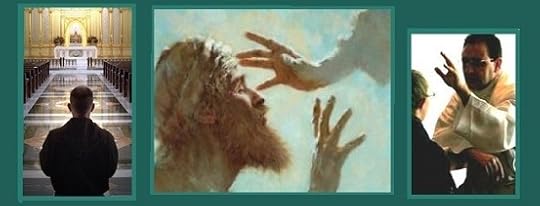Carl E. Olson's Blog, page 104
March 26, 2014
Neil deGrasse Tyson’s Cosmos: Filling in the Intellectual Gaps
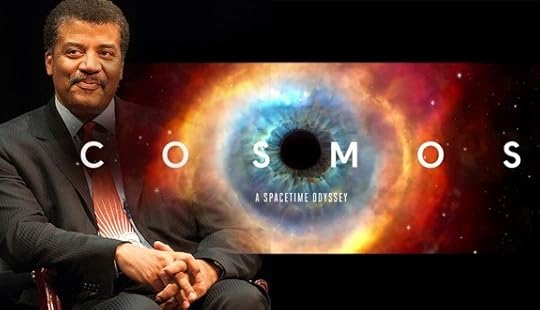
Neil deGrasse Tyson’s Cosmos: Filling in the Intellectual Gaps | Fr. Robert J. Spitzer, SJ | CWR
The narrative of a supposed antagonism between the Church and science often relies on errors of omission.
Several people have asked me questions about the accuracy of Neil deGrasse Tyson’s portrayal of the Catholic Church in the recent series Cosmos, which is airing on FOX. There is an important adage at the foundation of logic: “There are far more errors of omission than commission.” Regrettably Tyson’s presentation of the Catholic Church—and religion in general—in opposition to science presents serious errors of omission, so much so as to be incredibly misleading. I will attempt here to fill in a few of the many intellectual gaps in that oversimplified and lacking account.
The natural sciences, and philosophical reflection upon them, have been an integral part of the Catholic intellectual tradition since the time of the Copernican revolution. Indeed, Catholic priests and clerics played a central role in the development of natural science. For example, Nicolaus Copernicus (1473-1543), the originator of the heliocentric universe and its mathematical justification, was a minor Catholic cleric. Nicolas Steno (1638-1686), a Catholic Danish bishop, is acknowledged to be one of the founders of modern stratigraphy and geology. The Augustinian monk and abbot Gregor Mendel (1822-1884) is recognized as the founder of modern genetics. Msgr. Georges Lemaître, a Belgian priest and colleague of Albert Einstein, is acknowledged to be the founder of contemporary cosmology through his discovery of the Big Bang Theory in 1927. There are many other Catholic clerics who were integrally involved in the foundation and development of the natural sciences.
Some have contended that the Catholic Church manifested an “antiscientific attitude” during the controversies of Giordano Bruno and Galileo Galilei. But those controversies were not about the veracity of scientific method or its seeming heliocentric conclusion.
March 25, 2014
Why the Church Has So Much to Say about Contraception
The Side Effects of the Pill: Why the Church Has So Much to Say about Contraception | Dr. William Newton | HPR
The Church pays special attention to the issue of contraception because so many of the modern errors in moral theology converge in this particular question of conjugal morality.
There is an impression out there–in the world and even within the Church–that the Church is obsessed with the question of contraception, or at least gives too much attention to it in comparison to other issues. So, for example, one modern moral theologian, reading Veritatis Splendor, sees in it nothing more than a Trojan horse for another attack on contraception. He says:
It is not easy to avoid a sense of profound anti-climax, combined with a strong suspicion that what purported to be a critique of certain moral theories was, after all, only one more assault against the critics who found no real plausibility in certain official Catholic teachings about sex and, in particular, about contraception. 1
My contention in this essay is that the Church does, indeed, pay special attention to the issue of contraception, and with good reason. This is because so many of the modern errors in moral theology converge in this particular question of conjugal morality.
The truth of this contention is made evident by a careful reading of the famous–one might say infamous–Majority Report of the Papal Commission on Birth Control. For our purposes here, the significance of that report lies not so much in the fact that it advised a change in the Church’s teaching on contraception, as in the fact that it took to heart various systems of moral reasoning that are contrary to sound morality, and that are endemic in so much modern thought on moral issues. The aim of this essay is to examine them, thereby demonstrating the significance of Humanae Vitae, and the Church’s teaching on contraception, as a bulwark against a tidal wave of erroneous moral thinking. In short, these principles are: the principle of totality, the theory of proportionalism, the ideology of man’s unlimited control over nature, and a false notion of the sensus fidelium. 2
The principle of totality
Applied to the issue of contraception, the principle of totality claims that if a couple, on the whole, remain open to having children, then using contraception every once in a while, or for a certain period of their married life, is not wrong since these isolated acts are absorbed into the general orientation of the couple towards procreation.
Why College?
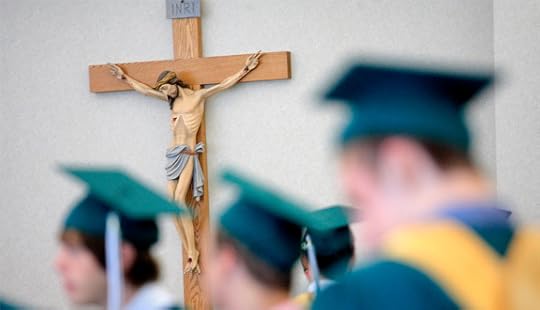
(CNS photo/Don Blake, The Dialog)
Why College? | Fr. James V. Schall, SJ | Catholic World Report
There are many reasons given for higher education, but how many of them take seriously ultimate questions and the permanent things?
The question—“Why college?”—lends itself to numerous, often amusing, answers: Colleges are designed to keep millions of youth off the labor market. Colleges are preparations for jobs. Colleges are funded country clubs that provide housing, board, games, social life, and delight during the least easily manageable period of human life. Colleges are run by political states to indoctrinate the young in the ideology of its (the state’s) choice. Colleges are set apart from politics wherein what is not political can be freely discussed. Colleges are places where we learn how to “research” things. Colleges are places where we develop new ideas. Colleges are places where we keep old ideas. Colleges are places where we defend silly ideas. Colleges are hi-tech training grounds wherein the future is anticipated. Colleges are degree-giving institutions mandatory for everyone. Colleges are places where professors are free to think whatever they want. Colleges are places designed for the benefit of their administrators. Colleges are all of the above. Colleges are none of the above.
Samuel Johnson, the mere reading of whom is a college education by itself, appears to have not completed his stay at Pembroke College, Oxford. He said, however, that the best thing we could do for a boy was “to teach him how to read.” The only addendum we might attach to that excellent advice is a recollection of C. S. Lewis. He relates that he grew up in a home in which there were many basic books and not much else to do in Belfast but read them. This advice about reading makes us wonder about the famous aphorism—“All work and no play makes Jack a dull boy.” I believe Lewis was called “Jack,” though I doubt that this admonition applied to him.
It does make us wonder what place “play” has in college. I do think that drama, music, and sports—both playing in them and watching them—have a place in college. Indeed, they may have a more central purpose than we are usually wont to assign to them. Things are taught on the playing fields of Eton that few professors know about unless they also played in their youth.
We may, in fact, live in a culture in which exists very few real “colleges” to which we might apply or attend.
"The Mystery of the Annunciation is the Mystery of Grace" by Joseph Ratzinger

The Mystery of the Annunciation is the Mystery of Grace | Joseph Cardinal Ratzinger (Benedict XVI)
The mystery of the annunciation to Mary is not just a mystery of silence. It is above and beyond all that a mystery of grace.
We feel compelled to ask ourselves: Why did Christ really want to be born of a virgin? It was certainly possible for him to have been born of a normal marriage. That would not have affected his divine Sonship, which was not dependent on his virgin birth and could equally well have been combined with another kind of birth. There is no question here of a downgrading of marriage or of the marriage relationship; nor is it a question of better safeguarding the divine Sonship. Why then?
We find the answer when we open the Old Testament and see that the mystery of Mary is prepared for at every important stage in salvation history. It begins with Sarah, the mother of Isaac, who had been barren, but when she was well on in years and had lost the power of giving life, became, by the power of God, the mother of Isaac and so of the chosen people.
The process continues with Anna, the mother of Samuel, who was likewise barren, but eventually gave birth; with the mother of Samson, or again with Elizabeth, the mother of John the Baptizer. The meaning of all these events is the same: that salvation comes, not from human beings and their powers, but solely from God—from an act of his grace.
(From Dogma und Verkundigung, pp. 375ff; quoted in Co-Workers of the Truth: Meditations for Every Day of the Year [Ignatius Press, 1992], pp. 99-100.)


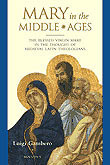







The annunciation to Mary happens to a woman, in an insignificant town in half-pagan Galilee, known neither to Josephus nor the Talmud. The entire scene was "unusual for Jewish sensibilities. God reveals himself, where and to whom he wishes." Thus begins a new way, at whose center stands no longer the temple, but the simplicity of Jesus Christ. He is now the true temple, the tent of meeting.
The salutation to Mary (Lk 1:28-32) is modeled closely on Zephaniah 3: 14-17: Mary is the daughter Zion addressed there, summoned to " rejoice", in formed that the Lord is coming to her. Her fear is removed, since the Lord is in her midst to save her. Laurentin makes the very beautiful remark on this text: "... As so often, the word of God proves to be a mustard seed.... One understands why Mary was so frightened by this message (Lk 1:29). Her fear comes not from lack of understanding nor from that small-hearted anxiety to which some would like to reduce it. It comes from the trepidation of that encounter with God, that immeasurable joy which can make the most hardened natures quake."
In the address of the angel, the underlying motif the Lucan portrait of Mary surfaces: she is in person the true Zion, toward whom hopes have yearned throughout all the devastations of history. She is the true Israel in whom Old and New Covenant, Israel and Church, are indivisibly one. She is the "people of God" bearing fruit through God's gracious power. ...
Transcending all problems, Marian devotion is the rapture of joy over the true, indestructible Israel; it is a blissful entering into the joy of the Magnificat and thereby it is the praise of him to whom the daughter Zion owes her whole self and whom she bears, the true, incorruptible, indestructible Ark of the Covenant.
(From Daughter Zion: Meditations on the Church's Marian Belief [Ignatius Press, 1983], pp. 42-43, 82.)
Related IgnatiusInsight.com Articles and Excerpts:
• Mary in Byzantine Doctrine and Devotion | Brother John M. Samaha, S.M.
• Fairest Daughter of the Father: On the Solemnity of the Assumption | Rev. Charles M. Mangan
• The Blessed Virgin in the History of Christianity | John A. Hardon, S.J.
• "Hail, Full of Grace": Mary, the Mother of Believers | Joseph Cardinal Ratzinger
• Mary in Feminist Theology: Mother of God or Domesticated Goddess? | Fr. Manfred Hauke
• Excerpts from The Rosary: Chain of Hope | Fr. Benedict Groeschel, C.F.R.
• The Past Her Prelude: Marian Imagery in the Old Testament | Sandra Miesel
• Immaculate Mary, Matchless in Grace | John Saward
• The Medieval Mary | The Introduction to Mary in the Middle Ages | by Luigi Gambero
• Misgivings About Mary | Dr. James Hitchcock
• Born of the Virgin Mary | Paul Claudel
• Assumed Into Mother's Arms | Carl E. Olson
• The Disciple Contemplates the Mother | Erasmo Leiva-Merikakis

• Biography of Joseph Ratzinger/Pope Benedict XVI
• All books by or about Joseph Ratzinger/Pope Benedict XVI
• Excerpts from books by Joseph Ratzinger/Pope Benedict XVI
• Articles about Joseph Ratzinger/Pope Benedict XVI
March 23, 2014
Available soon: "Making Gay Okay: How Rationalizing Homosexual Behavior Is Changing Everything"
Available in April from Ignatius Press:
Making Gay Okay: How Rationalizing Homosexual Behavior Is Changing Everything
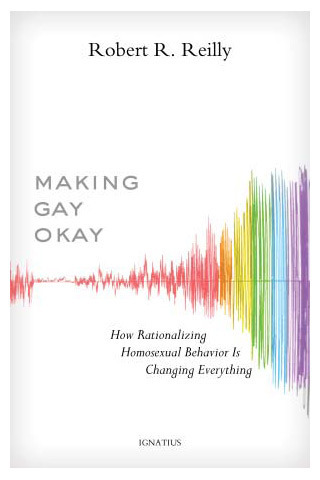
by Robert Reilly
Available April 2014.
Why are Americans being forced to consider homosexual acts as morally acceptable? Why has the US Supreme Court accepted the validity of same-sex "marriage", which, until a decade ago, was unheard of in the history of Western or any other civilization? Where has the "gay rights" movement come from, and how has it so easily conquered America?
The answers are in the dynamics of the rationalization of sexual misbehavior. The power of rationalization-the means by which one mentally transforms wrong into right-drives the gay rights movement, gives it its revolutionary character, and makes its advocates indefatigable. The homosexual cause moved naturally from a plea for tolerance to cultural conquest because the security of its rationalization requires universal acceptance. In other words, we all must say that the bad is good.
At stake in the rationalization of homosexual behavior is the notion that human beings are ordered to a purpose that is given by their Nature. The understanding that things have an in-built purpose is being replaced by the idea that everything is subject to man's will and power, which is considered to be without limits. This is what the debate over homosexuality is really about-the Nature of reality itself.
The outcome of this dispute will have consequences that reach far beyond the issue at hand. Already America's major institutions have been transformed-its courts, its schools, its military, its civic institutions, and even its diplomacy. The further institutionalization of homosexuality will mean the triumph of force over reason, thus undermining the very foundations of the American Republic.
Robert Reilly was Senior Advisor for Information Strategy (2002-2006) for the US Secretary of Defense, after which he taught at National Defense University. He was the director of the Voice of America (2001-2002) and served in the White House as a Special Assistant to the President (1983-1985). A graduate of Georgetown University and the Claremont Graduate University, he writes widely on "war of ideas" issues, foreign policy, and classical music. His previous book isThe Closing of the Muslim Mind: How Intellectual Suicide Created the Modern Islamist Crisis.
Praise for Making Gay Okay:
"If you read only one book on homosexuality, natural law theory, and the radical changes now being instituted within our culture, let it be this one!
Reilly exposes the unscientific reasons why homosexuality was normalized in the [American Psychiatric Association] diagnostic manual. He offers us some intriguing new material. In a clear, systematic, and engaging style, Reilly show us the inherent futility of same-sex acts, and eloquently explains what marriage really is. This book should be required reading for anyone who writes our laws-in fact, for anyone with cultural decision-making power. We must not allow the surging political tides to obscure what you and I ‘can't not know' about the nature and purpose of sexuality."
- Joseph Nicolosi, PhD, Co-Founder, National Association for Research and Therapy of Homosexuality (NARTH)
"Reilly has drawn on his extensive knowledge of classical political philosophy to explain the full scope of the dangers inherent in the modern homosexual rights movement. The movement threatens our very understanding of human nature, and hence of the American political regime that derives its understanding of rights and legitimate government from that nature. This book is a stark warning that should be read by every lover of liberty, and a call to action for those who would preserve it."
- John C. Eastman, JD, PhD Chairman, National Organization for Marriage Founding Director, Claremont Institute Center for Constitutional Jurisprudence
"This book is magnificent, a real achievement. For anyone interested in taking our country back from the sexual radicals, you must know how they did it, so rapidly, efficiently, even brutally. The gay rights movement slid through American institutions, both public and private, like a hot knife through butter. I suspect it has surprised even its proponents to see how fast we have capitulated. First philosophy fell, then psychology, the courts, education, the military and even the Boy Scouts followed. No one has told both the broad sweep and the specific details of this story better than Robert Reilly."
- Austin Ruse, President, Catholic Family and Human Rights Institute
"In our society, homosexuality has become more than a ‘sexual orientation'. It has now grown into a far-reaching movement seeking to redefine not only morality, but ideas about biology, human nature, law, and politics-indeed, to declare opposing views as beyond the pale of civilization. Robert Reilly has the multiple talents necessary to address the full range of relevant issues, from the philosophical to the practical. A rare tour de force on a defining question of our time."
- Robert Royal, PhD President, Faith & Reason Institute
"Robert Reilly shows that to go with the flow of the homosexual movement is to go against nature, science, children, marriage, the family and the common good; in fact to go against common sense. This movement is now the leader of a long-term pack working to undermine society, a process designed to bring chaos (see Gramschi) and dictatorship before freedom is enjoyed again. The time and the means to oppose are both narrowing. If this book does not move you to action nothing will."
- Patrick F. Fagan, Ph.D., Senior Fellow, Family Research Council
"The important contribution of Reilly´s book is explaining the background of the philosophic premises of the relevant Supreme Court cases. What drives those cases is not law, but ideology. This book effectively exposes that ideology."
- John S. Baker, JD, PhD Professor Emeritus, Louisiana State University Law School
"Plato teaches that societies take on the features and tastes of the persons most prominent in them. Reilly shows how America's ruling class is shaping our society according to its taste for homosexuality and its distaste for natural families. If you want to know the philosophical and legal background of the revolution that is being imposed upon America-and its consequences-read this book."
- Angelo M. Codevilla , PhD Professor Emeritus, Boston University; Author, The Character of Nations
"The mainstreaming of sodomistic practice is a sign that a culture has lost not only its faith but also its mind. Robert Reilly patiently and convincingly explains how that flight from reason occurred and what can be done about it."
- Charles E. Rice, JD, JSD Professor Emeritus of Law, University of Notre Dame Law School
"Robert Reilly is to be admired for tackling such an explosive topic with reason, balance, aplomb, and moral clarity. He shows how the rationalization of homosexual behavior has worked its way into the nooks and crannies of our public life-from parenting to foreign policy-and will be our culture's undoing if the current trend is not reversed. I hope that the compelling arguments in this book can play a key role in that reversal."
- Jay W. Richards, PhD Author, New York Times bestselling books Indivisible and Infiltrated
"Robert Reilly is a true Renaissance man, an expert in music, Islam, and cinema. In this work he explains how the acceptance of the rationalization for homosexual behavior may bring down our culture and society unless it is exposed, understood, and opposed.
- Fr. C. John McCloskey, Co-Author, Good News, Bad News
"A stiff brush against the fur of today's judicial and journalistic 'wisdom'. Read -- and argue."
- Michael Novak, American Enterprise Institute
March 22, 2014
Finding Jesus in the Catholic Church
Finding Jesus in the Catholic Church | R. Thomas Richard, Ph.D. | Homiletic & Pastoral Review
Our mission (as Church) is to bring about that meeting that can change lives, that can make disciples. Then, as a loving mother Church, we are to nurture and guide those disciples into fruitful holiness in Christ.
Have you heard former Catholics—now evangelical and fervent in the Lord—say things such as: “I had to leave the Catholic Church to find Jesus”? Have you heard anyone say, “Once I got out of the Catholic Church, I really heard the Gospel—and I got born again, and I got saved”?
We in the Church need to listen to such troubling claims; we need to take them seriously. It would not be helpful or charitable to dismiss quickly the persons or their stories with: “You couldn’t find him in the Church because you weren’t looking for him,” or, “The Mass is filled with the Gospel! It’s proclaimed in every Mass we offer.”
It may well be true that when these people were in the Church, they weren’t looking for Jesus. If they had searched, they would have found! The question for us—for the Church—is: Whose responsibility is it to insure that Catholics can and do “find Jesus” in his Church? I assert that it is not the responsibility of children to find their own food, to prepare their own meals, and to feed themselves. It is not the responsibility of children to educate themselves, to nurture and bring themselves to maturity, to make boys into men, and girls into women, to make disciples of themselves under the Headship of Jesus Christ. It is not the responsibility of children to make soldiers of themselves, to prepare for the coming battle, and to face the enemy at war with them in the world.
No, it is the responsibility of parents to raise their own children, and it is the responsibility of the Church to make her children, of any age, into disciples of Jesus, bringing them all to maturity in him.
Lent: a journey, an encounter, and a time of purification
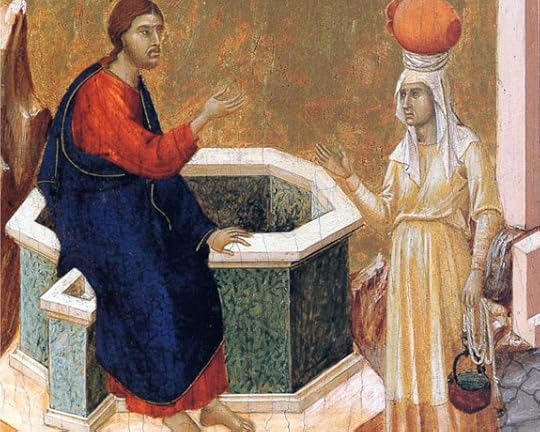
Detail from "Christ and the Samaritan Woman" by Duccio (1308-11)
A Scriptural Reflection on the Readings for Sunday, March, 23, 2014 | Third Sunday of Lent | Carl E. Olson
Readings:
• Ex 17:3-7
• Psa 95:1-2, 6-7, 8-9
• Rom 5:1-2, 5-8
• Jn 4:5-42
Lent is not merely a season, but a journey, an encounter, and a time of purification. Benedict XVI, in his 2011 Lenten Message, focused on these three aspects of Lent, stating, “As she awaits the definitive encounter with her Spouse in the eternal Easter, the Church community, assiduous in prayer and charitable works, intensifies her journey in purifying the spirit, so as to draw more abundantly from the Mystery of Redemption the new life in Christ the Lord …”
Today’s readings reveal the purpose of this journey, the meaning of this encounter, and the reason for this purification.
The Israelites, liberated from slavery in Egypt and save by the miraculous passage through the Red Sea, grumbled against Moses. Their anger toward Moses, who had been chosen by God to free them, had erupted after a short time in desert: “But you had to lead us into this desert to make the whole community die of famine!” (Ex 16:3). They become perversely nostalgic about their former slavery, saying, “Why did you ever make us leave Egypt?” (Ex 17:3). Because they lacked faith in God, they longed for the false security of chains and subjection. Faltering in the journey toward the promised land, they tested God.
Likewise, Lent can reveal to us the fragility of our faith, the frailty of our hope, the feebleness of our love. We might be tempted to blame God for our struggles with sin; worse, we may long for the comfort of sinful habits. It may seem easier to return to the slavery we know than to journey in faith toward the kingdom of God.
But in the midst of fasting from food and other temporal things, God provides sustenance. He is the Rock from which issues the gift of living water. The Samaritan woman encountered and tasted this water, of course, when she spoke with a mysterious Jewish man at Jacob’s well. Her encounter is a turning point, but it does not come easily or without questions. The paradox in the encounter is that while the woman thinks Jesus is thirsty for ordinary water, he really thirsts to give her supernatural life. For, as St. Augustine observed, Jesus “had not asked for the kind of water that she herself had understood, but … he himself was thirsty for her trust and was desirous of giving the Holy Spirit to her in her own thirst…”
Slowly, however, she began to realize that Jesus was inviting her to begin a new life, free from sin and selfishness. Sitting alone with Christ, looking upon his face and hearing his words, she began to be transformed. The process of repentance and conversion commenced, until she was able to give testimony to her neighbors of her encounter.
Like the Samaritan woman, we need to encounter Jesus, to look upon his face, to hear his words. “In that woman, then, let us hear ourselves,” wrote Augustine, “and in her acknowledge ourselves, and in her give thanks to God for ourselves.”
This thanksgiving comes from recognizing and embracing the gift of purification and holiness. This is the supernatural gift of justification, which is the restoration of communion with God, through his grace and mercy. “Since we have been justified by faith,” wrote St. Paul to the Romans, “we have peace with God through our Lord Jesus Christ…” This access to God is by faith, which is accompanied by the surety of hope and the outpouring of God’s live into our hearts. The three virtues of faith, hope, and love “dispose Christians to live in a relationship with the Holy Trinity. They have God for their origin, their motive, and their object—God known by faith, God hoped in and loved for his own sake” (Catechism of the Catholic Church, 1840).
Lent, as the Holy Father explains, is “a journey of conversion towards Easter” that causes us to “rediscover our Baptism”, through which we were transformed into children of God by water and the Holy Spirit.
(This "Opening the Word" column originally appeared in the March 27, 2011, issue of Our Sunday Visitor newspaper.)
Some thoughts on being flooded with news about "Noah"
by Carl E. Olson | CWR blog
The big release in movie theaters next weekend is Darren Aronofsky's epic film, Noah, starring Russell Crowe. In a short piece, "The Thing About Noah and the Ark", on the New York Times' site, Aronofsky wrote:
When I asked Russell Crowe to star in “Noah,” I promised him one thing: I would never shoot him standing on the bow of a houseboat with two giraffes sticking up behind him. That’s the image most people have of Noah and the ark and I didn’t want to give audiences what they were expecting. I wanted to break the clichéd preconceptions we have from children’s toys, adverts, 1950s biblical epics and even much of the religious art of the last two millennia: the old man in a robe and sandals with a long white beard preaching in some Judean desert. I wanted Noah’s story to feel fresh, immediate and real. So when my team and I started to imagine how to bring the prediluvian era to life, we threw away all the tropes and returned to the Bible. …
We realized that if we listened to the original text we would find a blueprint for a Noah story that was unique and unexpected. For instance, returning to the ark: When you look in Genesis, you find exact measurements for a big rectangular box, a giant coffin. It makes perfect sense. The ark didn’t need a curved hull of planed wood with a pointed bow and stern. The world was entirely covered with water and there was no need to steer and nowhere to go. So we created the rectangular-shaped ark for the film, biblically accurate down to the last cubit.
I've not seen the movie yet, but I think Aronofsky makes many good—even excellent—points. And it's notable that he appears to take the biblical account quite seriously, yet with an understanding that the early chapters of Genesis were not penned by scientists or modern historians. This, of course, is a sticking point for both some Christians and certain secular-minded folks; both, at times, try to force such literature into boxes it was not intended to fill: the box of "history" as understood by moderns and the box of "fairy tales" as derided by moderns. And, as soon as you say so, some folks will defensively retort: "You're denying the historicity of Genesis!" No, I'm saying, as I think Aronofsky is also stating, that those first chapters of Genesis are narratives produced and eventually written down by folks who had very different perspectives on, well, nearly everything than those of us living in the 21st-century West. That doesn't mean they aren't true; it does mean that they require some hard thinking and a refusal to find false comfort in knee-jerk reactions.
Anyhow, with that said, here is a very intriguing review of the movie, penned by the exemplary Steven D. Greydanus for National Catholic Register:
March 20, 2014
Who Is Pope Francis to Judge Not?
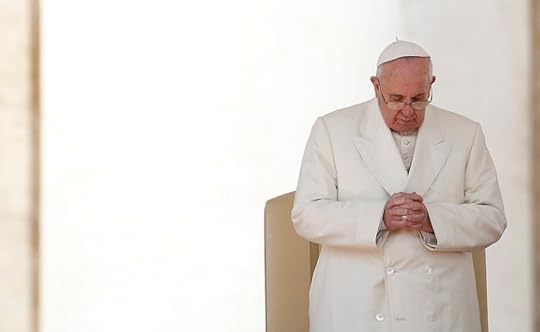
Pope Francis prays during his general audience in St.
Peter's Square at the Vatican Feb. 26. (CNS photo/Tony Gentile, Reuters)
Who Is Pope Francis to Judge Not? | Leroy Huizenga | CWR
The modern world cannot comprehend mercy because it cannot comprehend sin.
“Judge not, lest ye be judged,” says Jesus Christ. “Who am I to judge?” says his Vicar on earth, Pope Francis. And the World, standing as it does under Satan’s domination, as the New Testament affirms, tends to twist any words of goodness, beauty, or truth offered it. And so when Pope Francis uttered “Who am I to judge?” in an informal interview on an airplane last summer when asked about a “gay lobby” in the Vatican, the World denuded his words, stripping them of context and finding there (if not outright affirmation of homosexual relations) real daylight between Pope Francis and his predecessor.
It’s clear that Pope Francis was speaking of those with a homosexual orientation, and not approbating any behavior:
A gay person who is seeking God, who is of good will—well, who am I to judge him? The Catechism of the Catholic Church explains this very well. It says one must not marginalize these persons, they must be integrated into society. The problem isn't this (homosexual) orientation—we must be like brothers and sisters. The problem is something else, the problem is lobbying either for this orientation or a political lobby or a Masonic lobby.
Now, Pope Francis has done it again, deliberately, in his fervorino on Monday, St. Patrick’s Day, uttering “Who am I to judge?” And the World, once again, is tempted to take these words and twist them, as if Jesus’ words—and Pope Francis’ words—were license for license. For the World does not want to be challenged and converted; it wants to be affirmed. And so it would rather twist the words of Christ and pope than be saved.
If one reads the excerpts of the fervorino provided, Pope Francis’ words are clear enough both for those who are searching or for those of the faithful who would receive them:
The Sometimes Unseemly Art of Self-Promotion
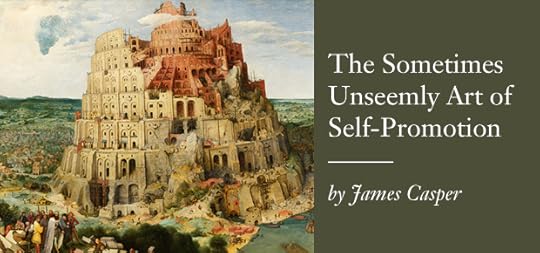
The Sometimes Unseemly Art of Self-Promotion | James Casper | IPNovels.com
There is nothing new about writers promoting themselves and their writing. Writers have only recently had television talk shows, Internet, and Facebook, but they have always found ways of bringing themselves to public attention.
Notoriety was one way: Sir Thomas Malory is reported to have written Le Morte d’Arthur while in prison for a variety of crimes, both petty and sensational. Two centuries later Sir Thomas More wrote A Dialogue for Comfort while imprisoned in the London Tower awaiting execution. (N.B. strategies not recommended for Ignatius Press novelists!)
Otherwise, with nothing electronic or digital in the picture, friends in high places could do it; tours on the highways and byways could do it; posters and handbills could do it; hanging around with notoriously drunken companions could do it. Whatever the risks, whatever it was, and whatever worked, writers have done it. The creative arts have seldom been a place for recluses and wallflowers. Reputations were built in the manner of cathedrals, from elevated platforms, often self-erected.
Chaucer did it by snagging positions at the English Court and passing his poems around with targeted dedications. Shakespeare flattered patrons. If we knew much of anything about Homer from two thousand years before, we would probably discover he did the same. Benjamin Franklin charmed Paris as a diplomat.
Closer to the present, Charles Dickens travelled twice to America to put on what amounted to a roadshow of dramatic readings. He got as far west as St. Louis. Oscar Wilde, who had yet to write much of anything, traipsed from one American city to another, lecturing with lily in hand and speaking with a languid, almost lisping drawl.
Carl E. Olson's Blog
- Carl E. Olson's profile
- 20 followers


